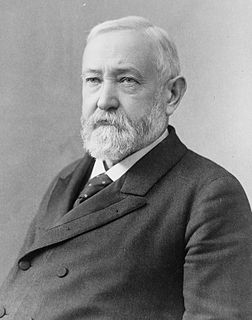A Quote by Ambrose
The rich man who gives to the poor does not bestow alms but pays a debt.
Related Quotes
The indiscriminate denunciation of the rich is mischievous.... No poor man was ever made richer or happier by it. It is quite as illogical to despise a man because he is rich as because he is poor. Not what a man has, but what he is, settles his class. We can not right matters by taking from one what he has honestly acquired to bestow upon another what he has not earned.
Better to me the poor mans crust,
Better the blessing of the poor,
Though I turn me empty from his door;
That is no true alms which the hand can hold;
He gives nothing but worthless gold
Who gives from a sense of duty;
But he who gives a slender mite,
And gives to that which is out of sight,
That thread of the all-sustaining Beauty
Which runs through all and doth all unite, -
The hand cannot clasp the whole of his alms,
The heart outstretches its eager palms,
For a god goes with it and makes it store
To the soul that was starving in darkness before.
Avoid debt that doesn’t pay you. Make it a rule that you never use debt that won’t make you money. I borrowed money for a car only because I knew it could increase my income. Rich people use debt to leverage investments and grow cash flows. Poor people use debt to buy things that make rich people richer.
If the "rich" were swarming into poor neighborhoods and beating the poor until they coughed up the dimes they swallowed for safekeeping, yes, this would be a transfer of income from the poor to the rich. But allowing taxpayers to keep more of their money does not qualify as taking it from the poor - unless you believe that the poor have a moral claim to the money other people earn.
The rich man, when contributing to a permanent plan for the education of the poor, ought to reflect that he is providing for that of his own descendants; and the poor man who concurs in a provision for those who are not poor that at no distant day it may be enjoyed by descendants from himself. It does not require a long life to witness these vicissitudes of fortune.










































